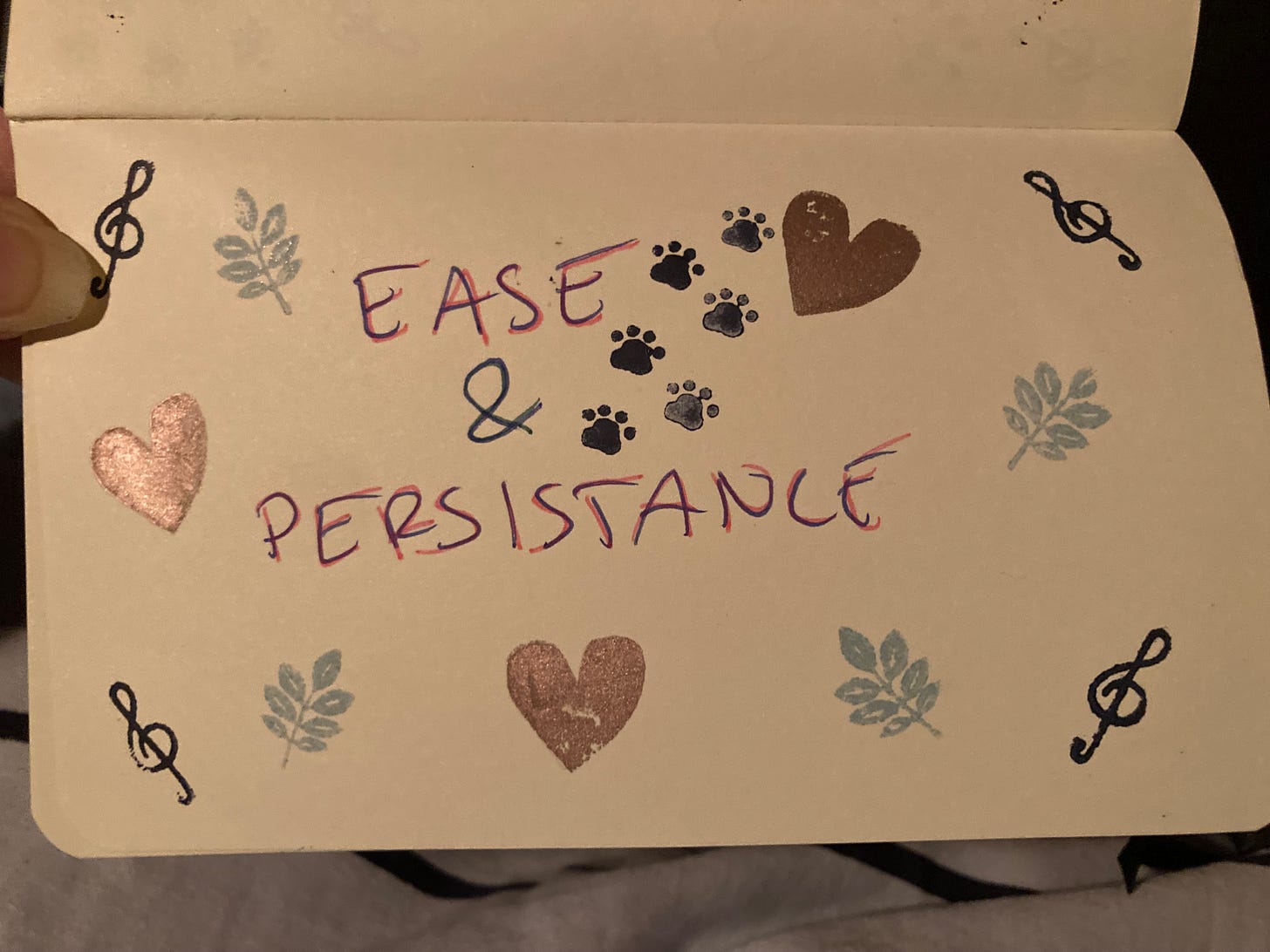Tiny creative acts: How I stay creative in the midst of chronic illness
Not all days are good enough for being creative, but on good days this is what I do to drive my creative work forward
One of my main dreams in life is to live a creative life where I live off my music, writings and teaching. I know, it’s a faraway dream right now, but I aim to do everything I can to work within that dream. If I can't get it all, at least I can have fragments of it.
Most of you know by now that I’m a singer-songwriter and I have a forthcoming album that will be released either this year or early next year. Most of the songs I wrote while I had mild and moderate ME/CFS and thereby more access to my brain.
Since I got severe ME/CFS I’ve lost more and more access to my inner world, something I’ve written about before. This, combined with even less energy in my body, I have had to change the way I’m creative.

I have about five minutes a day, on moderate to good days (this comes and goes in periods), where I do a tiny creative act. Sometimes, I can do ten minutes if it involves music, but the last time I tried fifteen minutes I crashed, so I’m not doing that again.
While it is a very different way of creating, and not as fun as the more chaotic ways I would create before, it works. I have written 5 ½ songs so far within the past fourteen months. And they’re good! It’s slow, but it works for me.
So here are my favourite tiny creative acts that help me stay creative in the midst of chronic illness exhaustion:
Word dump
I find a text, like an article or a poem, and skim through it while noticing any words that jump out at me or elicit some kind of emotion. I choose one word and write it down. Then I move on to another text and do the same thing. It might match the word I have written down already, it might not. Eventually I have enough words and I can begin to create short sentences I like and put them in my lyric diary. I love this exercise because I get new words and sentences that are surprising, while not using too much brain power.
Lyric diary
This is an electronic document on my Google Drive. It used to be a physical notebook, but I can’t read my own handwriting so a lot got lost. This is where I write any words that come to mind or that I hear. These days, when I don’t have consistent access to my inner world, it’s usually words or sentences I hear or read. I never pick a whole sentence from another song or poem, it’s always fragments. In this way, when I sit down to create a melody, I always have lyrics on hand.
Keep a dream diary
My dreams are very stressful and chaotic, as I’ve written about here, so keeping a dream diary is not easy. But once in a while I’ll have vivid, almost technicolor dreams and they make for great lyrics. I don’t write down the full dream as my dreams are never cohesive or story-like. Instead I’ll write down what I saw or felt in as simple sentences as possible or even just a word or two.
Stream of consciousness and freewriting journaling
I have a love-hate relationship with stream of consciousness journaling. Stream of consciousness journaling is basically writing down what's in your brain without thinking about it. You just write what comes up. These days, most of what comes up are variations on: “I’m so exhausted and sick and tired of lying in bed.” So it’s rare that I do stream of consciousness journaling, but I will use it if I am in a period where my brain is awake. What I prefer, these days, is freewriting on a particular topic or feeling or situation or prompt. I will set a timer for five minutes (sometimes just three if I’m tired) and then write without editing myself. I can only do this on good days, but I often find snippets for my memoir in these freewriting sessions.
Sense writing
I need to have a good day to be able to do this one. I choose one object or topic — the latest ones I’ve chosen were the moon, grief, airport, bed, cardigan, my room. I set a timer for five minutes and write in as much detail as possible what I see, hear, taste, smell, touch when I think of this object or topic. In another five minute session I’ll transfer whatever words or lines I like to my lyric diary.
Set an intention for a song I want to create
I usually do this in the evening before I go to bed. I’ll hone in on a certain feeling or sensation that I want to explore and just begin to feel it. I don’t write anything down, I focus on feeling what I want to express. I then tell my subconscious: “I want to write a song that conveys this feeling, please start the process.” This helps me set the mood and so I know which types of chords to begin to look for.
Find a chord progression
While lying in my bed I’ll find different chord progressions I like. I might look at a bossa nova chord progression and write different variations down, or look at a sad song and write down that chord progression. This is a five minute act in and of itself. When I have a good day I might sit at my piano for five minutes, or I take out a keyboard in bed depending on my energy levels and play around with the different chord progressions I found — I always end up with another progressions than what I started out with.
Sometimes that’s all that happens, and other times a melody starts to emerge. I make sure to record all my ‘playing around’ so it’s ready for another set of five minutes. After a few days of rest I might add some lyrics to that snippet of melody while lying in bed and start to write out the melody in Scorecloud. Eventually, adding up all the snippets of ‘playing around’ I end up with a song. This process usually takes a couple of months as everything is chopped into five minute increments and I often need many days of rest in between.
Find a rhythm
This one goes hand in hand with finding a chord progression. But it’s something I will focus on in a five minute session. I don’t use drums in my music, but I might find a drum beat I like that will colour how the chord progression is made. I always look towards other genres than my own for this.
I Remember
My favourite writing teacher is Jeannine OuelletteWriting in the Dark with Jeannine Ouellette. She has an exercise called ‘I remember’, where you choose a memory and write down as many vivid details as possible. It doesn’t have to be cohesive. I’ve used this for my memoir writing and I’ve also used it for my lyrics. I do need to have a very good day to be able to do this exercise, but I love it and it can be done in five minutes. You can read more about it here.
Write a short dialogue between me and my inner child
I sometimes get out my journal and ask my inner child, Little M, how she’s doing? She’s never too happy because she’s bored, but she loves it when I pay attention to her and I feel a sense of ease and grounding after I have dialogued with her. I don’t necessarily use the dialogue for my songs, but I use this to stay connected to my inner child. She has a certain way of seeing the world and she’s important when it comes down to starting, finishing and editing my songs.
Bedazzle a word or a quote
I do this when I’m too pooped for anything else. I’ve bought a few rubber stamps and ink pads from Perlenfischer and I love decorating a word or a quote to really embody the meaning.
Pick a tarot card
Also when I’m too pooped for anything I’ll pick a tarot or oracle card. I’ll usually ask a question or just do a simple ‘Head, heart, now’ spread (h/t Susannah Conway) This helps me to stay connected with myself and to be reminded to stay on track.
I have (many) days where I’m not able to do any of this and I struggle on those days. I get so bored and blue and wonder when the next available day for being creative will come around. This is part of the creative life when living with chronic illness: accepting all the days when you can’t work on your stuff.
Over to you:
How do you stay creative amidst limitations or chronic challenges?
Do you have any exercises to share?
What are your dreams for your creativity?
Did you miss?
The shadow side of mind-body healing: Overcoming self-blame and shame
Grieving the loss of my inner world
Dealing with chronic illness isolation by becoming my best friend





Thank you for using your precious creativity to write these posts, Madelleine. I keep reminding myself: forward is forward. In 229 days I have written nearly 50,000 words of a first draft. I ask myself to write even one sentence. A few days I write as much as 500 words. I have missed many days. This is more than I wrote when I was healthy. The irony is not lost on me.
So many great inspiring suggestions here. Love the bedazzle a word option for a micro moment of creativity.